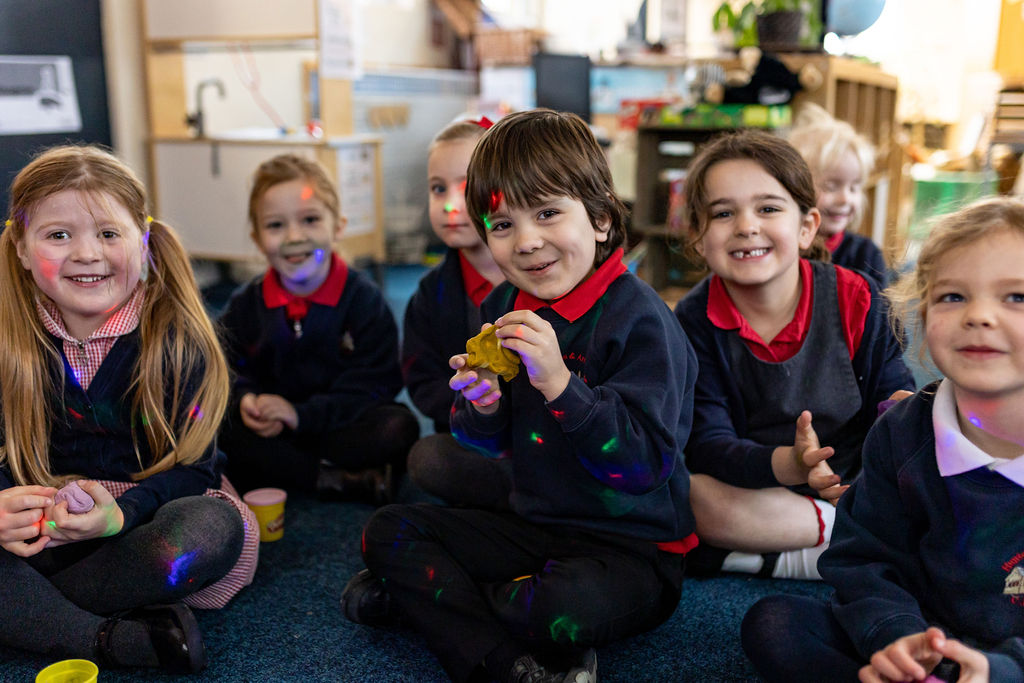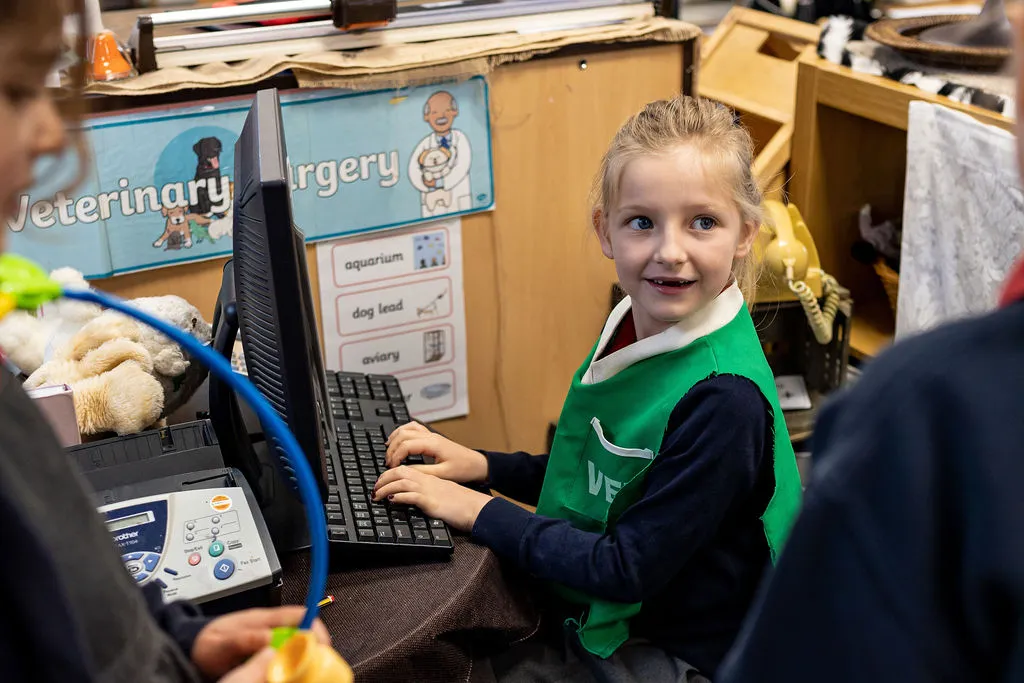INTENT – The EYFS Curriculum
Our intention is to give all our Hunton & Arrathorne Primary School children the requisite foundation skills, knowledge and support for each of them to fulfil their potential and to ensure a smooth transition into Year 1, and their school life beyond that. We have used the Statutory Framework for the Early Years Foundation Stage (EYFS) to design a curriculum that enables our children to succeed through cooperative and collaborative learning principles, and which recognises the children’s prior learning from previous settings and their experiences at home. This will ensure all children achieve a good level of development by the end of the EYFS and meet the Early Learning Goals. Safeguarding and welfare is a high priority in our school; we welcome and celebrate differences amongst ourselves, our community and across the world to support children in their progress equally. Children with particular needs, including SEND, receive the appropriate support to enable their individual successful development. We work in partnership with parents, carers and other service providers to build the trusting and positive relationships essential for all the children’s continued development. We are committed to providing a play-based approach, with health and wellbeing embedded into our routines and practices, which will ensure high levels of engagement and autonomy alongside challenge and feedback in a safe environment.
INTENT – The EYFS Curriculum
School Vision
Our curriculum is rooted in our core values ‘Care – Aspire – Excel’, which permeate all actions in our school. Further to this, our ‘Curriculum Aims’ are bespoke to our children and their individual needs.
Through careful weaving into the curriculum and wider school life, it is our intent that pupils at Hunton & Arrathorne Community Primary School will be:
- Lifelong readers
- Happy and healthy
- Inquisitive, with a thirst for knowledge
- Change-makers
- Risk takers
- Creators
Overarching Principles of the Early Years Foundation Stage
The Early Years Foundation Stage Guiding Principles:
- Every child is a unique child, who is constantly learning and can be resilient, capable, confident and self-assured
- Children learn to be strong and independent through positive relationships
- Children learn and develop well in enabling environments with teaching and support from adults, who respond to their individual interests and need and help them to build their learning over time
- Children benefit from a strong partnership between practitioners and parents and/or carers
- Children develop and learn at different rates
Characteristics of Effective Teaching and Learning
| Playing and exploring: | Children investigate and experience things and ‘have a go’. |
| Active Learning: | Children concentrate and keep on trying if the encounter difficulties and enjoy achievements. |
|
Creating and thinking Critically: |
Children have and develop their own ideas, make links between ideas, and develop strategies for doing things. |
Areas of Learning and Development in the Early Years Foundation Stage
There are seven areas of learning and development that shape learning in the Early Years Foundation Stage. All areas of learning and development are important and inter-connected. There are Prime areas and Specific areas. In Reception, adults will focus strongly on supporting children to develop within the prime areas as they are important in igniting children’s curiosity and enthusiasm for learning, helping them form relationships and thriving. Children will also be supported in applying and strengthening their prime skills in the specific areas of learning. We strive for excellence in all areas of learning and ensure that all children are ready for their next stage of learning.
The Prime areas:
- Communication and language
- Physical development
- Personal, social and emotional development
The Specific areas:
- Literacy
- Mathematics
- Understanding the world
- Expressive arts and design
IMPLEMENTATION – The EYFS Curriculum
Our thoughtfully structured, well-planned and sequenced curriculum ensures we are able to provide inspiration for learning, with abundant flexibility for children to follow their own interests and ideas. The timetable is carefully structured so children are given a balance of child-initiated and adult-directed activities, play based learning, large group, small group and one to one sessions. During these sessions, adults can systematically check for understanding, identify and respond to misconceptions quickly and provide real-time verbal feedback which results in a strong impact on the acquisition of new learning.
Children are provided with ample time for ‘exploration’ throughout the variety of experiences carefully devised to engage and challenge them in the provision. The curriculum is planned for the inside and outside classrooms and equal importance is given to learning in both areas.
Communication and Language is highly valued in our EYFS curriculum. We strive to provide a language rich environment. We do this by interacting purposefully with children and engaging in conversation. We value the children’s thoughts, ideas and suggestions and listen to them with interest. We endeavour to develop their repertoire of language by modelled and exposing them to high level vocabulary in the provision.
One of our school aims is for our pupils to become ‘Lifelong Readers’ and to encourage a love of reading from an early age. Across the school we have curated a list of carefully planned and sequenced texts to read and share throughout the year with the children. The aim is to expose children to a range of books that not only develop a love of reading, but deepen their communication, vocabulary and comprehension skills. These books are embedded in our provision through activities, story sessions and on display for children to access independently.
We follow the Little Wandle SSP Programme. Daily sessions in Reception, increase in duration from 10 minutes to 30 minutes by the end of the Reception year. From week 4 of Reception, the children partake in 3 reading sessions per week with a trained member of staff with a book matched to their phonic knowledge. We find this programme helps us create confident and fluent lifelong readers who are enthusiastic about reading.
In Maths we use the White Rose Maths Scheme. Pupils learn through games and tasks using concrete manipulatives and pictorial structures and representations which are then rehearsed, applied and recorded within their own child-led exploration. This scheme complements our high-quality learning environments and facilitates meaningful interactions with adults to support the children’s development of mathematical thinking and discussion.
Exciting, purposeful and contextual activities are planned to build on children’s natural curiosity for the seven areas of learning. We have ‘hooks’ for the children to be inspired and engaged with their learning. We weave trips and experiences into the curriculum, which are plentiful; creating life long memories and enable to children to draw upon personal experiences and make links between their learning.
Our carefully planned progression of routines and expectations throughout their first year of schooling prepares children for a smooth and successful transition into Year 1 at Hunton and Arrathorne. Our EYFS children are taught in the same class as Year 1 children therefore ensuring that although they have moved to the National Curriculum, their daily routines, practice and adults remain the same solid start in Year1
IMPACT
The impact of our stimulating environment and enriching curriculum, supported and delivered by our committed and experienced practitioners, will be a cohort of children who have the requisite foundation knowledge, skills and confidence to progress successfully to the next stage of their primary education; they will be impassioned learners who show drive, perseverance, resilience and creativity, and each an individual who is kind to themselves, their peers, community and the world. They will have a wide-ranging vocabulary and be confident communicators, who are well-prepared for the next stage in their journey.
Parents and carers will feel fully informed of their child’s progress as well as being completely involved in their learning journey through regular face-to-face interactions and digital communication with the practitioners.
The impact of our EYFS curriculum is under constant review utilising the judgement of our experienced practitioners and the data collected through the statutory Reception Baseline Assessment (RBA) and the continuous evidence-gathering and grading of each child’s progress against the Early Learning Goals.
All children will make good progress from their starting points and be happy, healthy and confident learners going forward.

